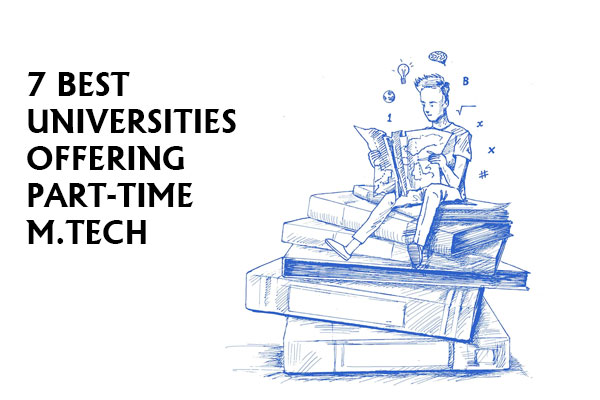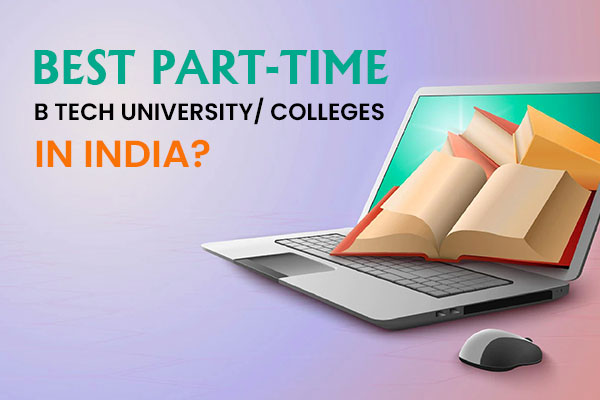B.Tech - Working Professional
Introduction
If you have other obligations or work commitments that prevent you from enrolling full-time in a program, you might want to consider a part-time BTech program. It can be a more manageable and flexible way to complete a degree while juggling other obligations. But you should pay close attention to things like the program's reputation, accreditation, and compatibility with your career objectives. Furthermore, studying part-time may take longer to finish, so it's crucial to consider the advantages and disadvantages according to your unique situation. My first college has the option of pursuing a part-time BTech course for working professionals.
For professionals who wish to take their career to the next level, the BTech program offers an excellent option because it allows them to enrol in classes while still working. For those who are employed, an online BTech degree is a good choice. Since BTech online courses are offered in the evenings, on weekends, or on holidays, it is preferable for working individuals to select a class time that works best for them.
What is a B.Tech Course?
Three- to four-year undergraduate engineering degrees that give students a solid foundation in technical skills and knowledge in a particular engineering field are called bachelor of technology (B.Tech.) degrees. A degree in this field equips students for jobs in a wide range of sectors, including manufacturing, technology, aerospace, automotive, and construction. After earning a B.Tech., graduates can go on to work as project managers, researchers, engineers, consultants, or pursue further study in advanced engineering fields.
Why Should a WorkingIndividual Pursue a B.Tech. Course?
Many advantages can arise from earning a Bachelor of Technology (B.Tech) degree in India for working professionals. First of all, it provides individuals with a solid grounding in engineering concepts and practical abilities, setting them up for a variety of career paths in disciplines like software development, electronics, mechanical engineering, and more. Furthermore, one's earning potential and job prospects can be improved with a B.Tech. degree from an accredited university. In addition, the technology and engineering sectors in India are flourishing, providing B.Tech graduates with numerous chances to support innovation and growth across a range of industries.
Admission Procedure for the B.Tech. Course for Working Professionals in 2024:
Entrance exams and merit-based evaluations will be part of the BTech admissions process. Well-known national and state exams like JEE Main, JEE Advanced, MHT CET, BITSAT, AP EAMCET, SRMJEEE, WBJEE, and VITEEE are examples of exams that are used.
Eligibility Criteria for BTech for Working Individuals:
- Participants in B.Tech for Working Professionals must have earned a three-year diploma in any engineering discipline or polytechnic certificate. The second year of the engineering program may be entered by these diploma holders. Because of this, they can finish the course in three years and have an advantage of one year.
- Candidates must have at least two to three years of work experience in their area. This requirement ensures that the college is for those who already have jobs and want to improve their career advancements and skills.
Working Professionals' BTech Course Duration:
The duration of the BTech program varies depending on the type of university or college, but it typically lasts three to four years.
BTech Specialization Courses for Working Individuals:
Working professionals can select from a variety of specialization courses based on their interests and career goals. They are listed in the following order:
- Computer Science and Engineering
- Mechanical Engineering
- Artificial Intelligence
- Chemical Engineering
- Civil Engineering
- Automobile Engineering
- Biotechnology
- Cybersecurity
- Aeronautical Engineering
- Electrical Engineering
Skills Required for a B.Tech Course for Working Professionals:
Following the completion of a B.Tech. course, candidates frequently discover that the following abilities are helpful for pursuing employment in the field: The skills can vary depending on the specialization courses.
- Programming Languages: Working knowledge of languages used frequently in software development, such as Java, Python, C++, etc.
- Algorithms and Data Structures: Knowledge and utilization of basic algorithms and data structures are essential for developing software and addressing issues.
- Data manipulation and management require an understanding of SQL and database systems.
- Knowledge of web technologies like HTML, CSS, and JavaScript, as well as frameworks like Angular or React, is required for web development.
- Systems knowledge: familiarity with Linux and Windows environments as well as an understanding of operating system principles.
- Networking: A foundational understanding of networking principles and protocols is frequently necessary, particularly for positions in network engineering or system administration.
- Knowledge of version control systems, software testing techniques, and the software development lifecycle is required for software engineering.
- Problem-solving and Analytical Thinking: Capacity to apply critical thinking and logical reasoning to tackle and resolve complicated issues.
- Communication Skills: Working in a team, comprehending client needs, and presenting technical solutions all depend on effective communication.
- Constant Learning: Since the tech sector is always changing, success in the long run depends on one's ability to pick up new skills and adjust to new situations.
Gaining these abilities in addition to the technical knowledge acquired through a B.Tech in any course can significantly improve an individual's employment prospects.
Top colleges for B.Tech for Working Individuals:
Top Colleges for BTech for working individuals:
Career Opportunities after BTech for Working Professionals:
There are several career options after completing a BTech for working people. They are below-mentioned:
- Tech, and then research.
- Tech, and then job.
- Tech and then teaching, or PhD and then teaching.
- Job immediately after B.Tech.
- MBA and then a job.
- Exams like IAS, IES, UPSC, etc. (civil services)
- Exams like SBI-PO, etc. for banking jobs.
- Exams like DRDO-SET, BARC, etc. are for jobs in research.
B.Tech Course Highlights:
-
Course Name: Bachelor of Technology for Working Professionals
-
Course Level: Graduate
-
Course Duration: 3–4 Years
-
Examination Type: Semester-wise
-
Eligibility: One must have completed their 10+2 in science with at least 50% marks from a recognized board.
-
Admission Process: merit-based or entrance exam
-
Average Annual Fee: INR 90,000-300,000
-
Average Annual Salary: INR 300,000-600,000
Read Also:
Top Courses
Updates
-

Part Time MBA Programs in India - Unlimited guidelines 2023
September 09, 2022 -

Can I Pursue a Part Time B.Tech after Getting My Diploma?
September 09, 2022 -

7 Best Universities Offering Part-time M.Tech
September 05, 2022 -

Best Part-time B Tech University/ Colleges In India?
June 28, 2022

